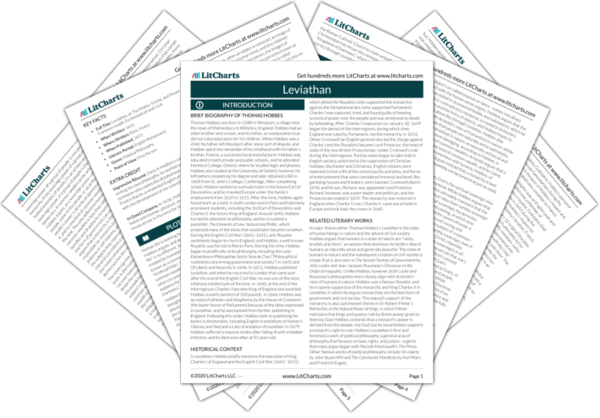Summary
Analysis
The purpose of speech is to transfer thoughts into something verbal. God first used speech to talk to and instruct Adam, and there are four ways in which a person can abuse speech. First, one may express their thoughts incorrectly, thereby lying to themselves and others. A second abuse is the use of metaphor, which uses words in ways other than what they are intended for. Third is the telling of a lie, and the fourth abuse of language is using words to harm or insult someone else.
From Hobbes’s perspective, abusing speech is not necessarily a bad thing. Furthermore, one can express their thoughts incorrectly through ignorance and no fault of their own. While the abuse of speech includes those who lie or insult others with words, it also includes the use of rhetoric and persuasion through speech.
Themes
Speech is remembered due to the naming of things and the connections formed between them. Names can be proper—like Peter or John—or they can be common, like human, tree, or bird. Two names can be joined together in speech, and that speech is ether true or false. Hobbes points out that speech, not things, is true or false; therefore, where there is no speech, there can be neither truth nor falsehood.
For Hobbes, the naming of things and the connections formed between them is the very foundation of philosophy, or at least it should be. This opinion is why Hobbes spends so much time laying the groundwork for his philosophy—he must name everything and explain the connections between them.
Themes
Truth consists of the right signification of things, which is called a definition, and the differences between names and definitions can be reduced to four general areas. First, a thing can be given a name or definition for its “Matter,” meaning, for instance, something is alive or not. Secondly, an object can be named and defined based on its quality, that being, among other things, that an object is moving, or long, or hot. Third, objects are considered and named in relation to people’s own bodies based on whether that thing is part of the self. Lastly, names and definitions are given to words in general, such as an affirmation, a narration, or a sermon, and such names are either negative or positive.
Hobbes later contends that most philosophy does not contain truth, as most philosophy does not consist of the right signification of things. Definitions used in philosophy are either incorrect, vague, or, in Hobbes’s opinion, complete nonsense. If a particular philosophy is grounded in false definitions, or no definitions, then the entire philosophy is false. Hobbes defines each word he uses in his philosophy in an attempt to make his argument infallible and beyond dispute.
Themes
Names that do not fall under these four general categories are “insignificant sounds,” which are sounds that have not yet been defined. A type of “insignificant sound” is when two contradictory words are joined, such as in the phrase “incorporeal body.” When hearing speech, a human makes connections in their thoughts based on previous sense perceptions and accepted definitions in a process known as understanding; however, Hobbes warns that one must “take heed of words.” One person’s wisdom can be another’s fear, and one person’s idea of justice may be cruel to another.
Hobbes’s reference to an “incorporeal body” is another allusion to Catholicism. Incorporeal bodies, or spiritual bodies, are central to Catholic belief, as God is often referred to as the Holy Ghost, part of the Trinity. Such a phrase is contradictory because something that is “incorporeal” is without matter; a body, by definition, has mass and takes up space. Putting these words together creates an “insignificant sound,” and to Hobbes, such phrases are nonsense.
Themes
Literary Devices
Get the entire Leviathan LitChart as a printable PDF.













